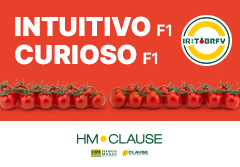Slow start of the ‘eco’ tomato campaign in the Levante region and along the coast of Granada due to high temperatures, but Balcón de Níjar is expecting to grow by 5%
The summer warmth lasted until mid-November, lengthening the crops in high mountain areas and delaying the plantations at lower levels by a few weeks. The result is worth mentioning in two of the most important areas for ecological tomatoes, Níjar and Motril, where the campaign did not come into full production until virtually the first week of January, when normally production is already in full swing in November. However, this delay is welcome because as the productions in Central Europe have been extended, produce has not been accumulated and it has come onto the market in a staggered way. This is confirmed by David Caparrós, manager of Balcón de Níjar. The company specialising in ecological cherry tomato production continues to grow and forecasts an increase in its volume and surface area by 5%, reaching 48 hectares and 3.2 million kgs in 2017/18. It is repeating its upward curve after a year where, although “it could have been excellent,” it was just “good” because of the bad summer: it was “the worst summer of the last four years, in production and prices,” but the annual result was balanced out with +20-25% in prices and -20% in production.
This year, the company will continue with its commitment to diversification, with a larger volume of vine tomatoes (8 hectares in total), although the main part of its production continues to be the cherry tomato (85% of the total). It leads the round segment, which is tending to lose place in favour of pear tomatoes (20%). “It is a generalised trend that we started seeing a few years ago, due to the greater flavour and quality that the pear cherry tomato varieties usually have.” It is also increasing its volume of mini watermelons and slightly in peas, a rotation crop that complements its tomato offer and that we will be able to see on the company’s stand at Fruit Logistica, located in Hall 18 B-03b.
Holland continues to grow
Balcón de Níjar is a company with a clear export vocation and most of its market share goes to Central European and Scandinavian countries. “Sales in Germany continue to grow. France has stabilised in bio and the Scandinavian countries and Holland are on the rise, mainly Holland, even more than Germany, at least in our case,” Caparrós states. He also underscores an aspect to be taken into account: “with the entrance of the mixed groups, the ‘eco’ market has become very distorted. It is complicated to forecast what is going to happen each week and we are seeing some important fluctuations in prices, which has not happened before in ecological produce.” For some time now, there have been auctions where bio fruit and vegetables are marketed, but the large volume taken by important retail stores or their purchasing centres mean they usually operate directly with the companies and not with the auctions. In Spain, he asserts that “large chains such as Alcampo or Carrefour are consuming more and more eco.” And low-cost stores such as Aldi, Lidl and others are encouraging the prices to become more reasonable for consumers, motivating consumption. “Previously, the chains tripled the price of eco compared to conventional produce.”
























